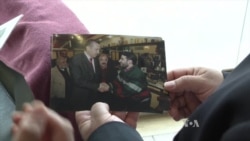The working-class, socially conservative neighborhood of Kasimpasa, in Istanbul, helped shape the man who would become Turkey’s most powerful figure in decades.
Recep Tayyip Erdogan once sold bread on these streets. It made him tough and kept him close to the common person’s values of religion and pride.
And it nurtured his dream to make Turkey great again.
The people here remember him, some with brotherly pride.
Yasar Ayhan, and his father before him, were Erdogan’s barbers.
“We are from the same village as the respected president, whom I love very much," Ayhan says.
'We couldn't' imagine
Social Media in Turkey
Social Media in Turkey
October 2015: Police seize the Ipek Koza conglomerate, one of one of Turkey’s largest media organizations, days before the November 1 general election; reports that Facebook, Twitter and other social media outlets were blocked following a devastating October 10 terrorist attack in Ankara that killed 102 people who had gathered for a peace rally
September 2015: Istanbul prosecutors launch investigation into one of the country’s biggest media groups, Doğan, for alleged terrorist propaganda. The move followed raids on the newspaper Nokta and the blocking of the daily Cumhuriyet’s website.
September 2015: Reporters Without Borders on Turkey: “Censorship is becoming increasingly widespread as the security situation continues to deteriorate amid a major political crisis”
May 2015: About 80,000 websites were reportedly blocked in the country as of this date
April 2015: Twitter, Facebook, and YouTube were temporarily banned until they complied with requests to restrict access to sensitive content. In the first half of 2015, 92 percent of all court orders to remove content received by Twitter worldwide originated in Turkey.
March 2015: Laws granting authorities the power to block Internet sites and allowing access to user data without a warrant are reinstated after the Constitutional Court had overturned those provisions in October 2014
May-June 2013: During the highly publicized “Occupy Gezi” protests in Istanbul's Taksim Square, the number of Turkish Twitter users rose from two to eight million. The role of social media in weakening the ruling party’s control over the flow of information led to new laws to censor content.
Sources: Freedom House, Reporters Without Borders
The Turkish leader doesn’t visit as often as he used to, but he has never lost touch with his roots, something that Ayhan, who sees Erdogan as a big brother, marvels at.
“Really, we couldn’t in those days imagine that he would one day become president," Ayhan remembers. "Our minds were not open to that. We were guessing that he would become a mayor, prime minister, but not president.
"His charisma, position, behavior and success was showing some promise. But we couldn’t imagine this," he says.
Tensions are high ahead of Sunday’s parliamentary elections in Turkey, where the legacy of President Erdogan is at stake.
He has dominated Turkish politics for more than a decade, promoting himself as a leader of the Islamic world, ushering Turkey back into a role akin to what it had as the seat of the Ottoman Empire.
Opponents, however, accuse him of amassing power and wealth, and pushing the country toward a dictatorship.
'Street fighter'
Fadi Hakura, an associate fellow at London's Chatham House, says, “Erdogan traditionally has been a street fighter. His style of politics is robust, muscular, cutthroat, confrontational, and combative.
"That’s the politics that Erdogan understands, feels and practices," Hakura says.
In his tenure, Erdogan has launched massive infrastructure projects, such as new metro lines and a new suspension bridge spanning the Bosphorus strait. The economy boomed on his watch, with growth rates near 9 percent.
But as that growth slowed, his support shrank, and critics say Erdogan – once pragmatic – became less tolerant of criticism. Then, a crackdown on the media -- the most recent being Wednesday, when Turkish police stormed the offices of an opposition media company linked to a U.S.-based cleric and foe of Erdogan.
Despite that, in Erdogan’s old neighborhood, a stadium is named after him and the image of the tough, semi-professional footballer that he once was, remains.
In Sunday’s election, the party Erdogan founded seeks to regain the majority it lost in parliament last June. They may also tell whether Erdogan emerges as the powerful figure he has dreamed of becoming.





